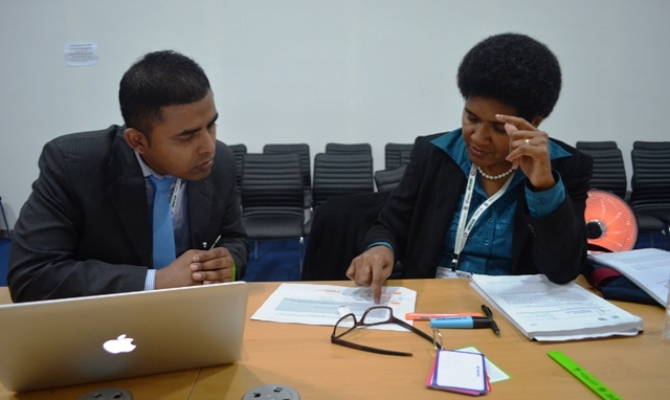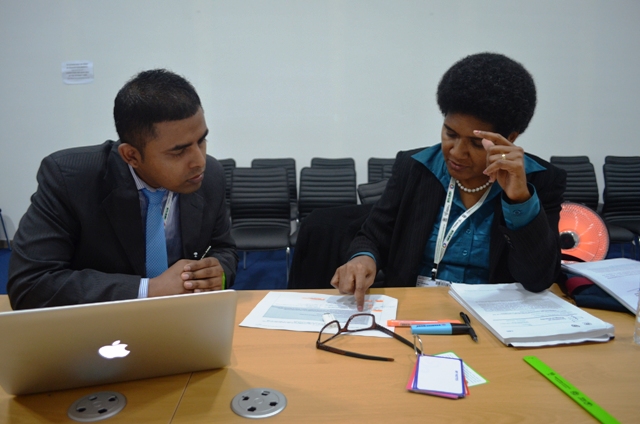
Island and Ocean Ecosystems
 L - R Ms. Eleni Tokaduadua with Mr. Rahul Chand of Fiji Department of Environment at the CBD COP 12
L - R Ms. Eleni Tokaduadua with Mr. Rahul Chand of Fiji Department of Environment at the CBD COP 1209 October 2014, Pyeongchang Korea, CBD COP12 - Fiji was at the center of a case study underway on the participatory processes in the revision of National Biodiversity Strategies and Action Plans.
Known as NBSAP's, over 190 parties to the Convention on Biological Diversity have revised these plans to take into account the new global strategic plan 2011 - 2020 to halt biodiversity loss. These NBSAP's are the main vehicles of national implementation of the CBD and are the processes through which societies unite to decide where, when and how biodiversity is to be conserved, used sustainably and the benefits of this use are shared equally.
A review to reflect on the effectiveness or limitations of this participatory process was conducted in 10 developing countries including Fiji. The results of which were discussed during a special lunchtime event at the 12th Conference of the Parties to the CBD in Peyongchang, Korea.
In Fiji a communications strategy was an integral part of the NBSAP process with various communication channels used to reach the public and inform them however despite these efforts many peoplke in Fiji were not aware of the NBSAP process.
"One strong highlight for us is that our NBSAP is based on the threats so everyone has contributed to this and based on that it has become everyone's role to work on addressing our biodiversity threats," said Ms. Eleni Tokaduadua, Principal Biodiversity Officer of the Government of Fiji.
"What we did learn is that we've been focusing so much on implementing the NBSAP we now need to strengthen our engagement of our communities. In order to do this we will need funding support to help develop and produce materials as well as to ensure that all our work is translated into the local vernacular."
The case study concludes that one reason why communication efforts have not reached all intended stakeholders is because participation to meetings and workshops organized have usually been delegated to technical staff who do not properly communicate information to decision-making staff in their respective departments and organisations.
It shows that communication within different institutions and stakeholder networks still needs improvement.
"We'd like to thank the International Union for Conservation of Nature and the Secretariat of the Convention on Biological Diversity for selecting us to be a part of this review," said Ms. Tokaduadua.
"The results from these have highlighted both our strengths and the areas that we can improve, it will help guide us as we continue implementing our NBSAP in Fiji."